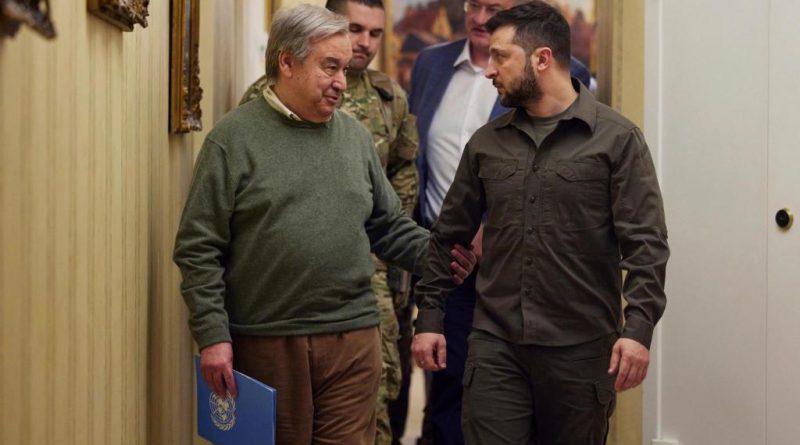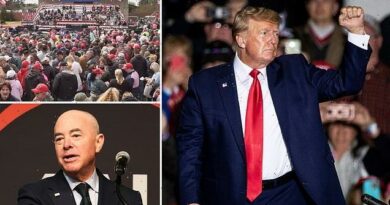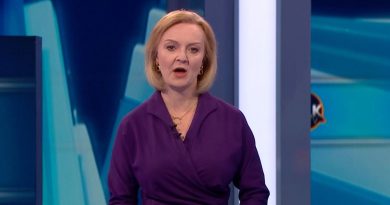High-level talks in Ukraine yield little reported progress – The Denver Post
By DEREK GATOPOULOS and SUZAN FRASER
LVIV, Ukraine (AP) — Turkey’s leader and the U.N. chief met in Ukraine with President Volodymr Zelenskyy on Thursday in a high-powered bid to ratchet down a war raging for nearly six months. But little immediate progress was reported.
Turkish President Recep Tayyip Erdogan said he would follow up with Russian President Vladimir Putin, given that most of the matters discussed would require the Kremlin’s agreement.
With the meetings held at such a high level — it was the first visit to Ukraine by Erdogan since the war began, and the second by U.N. Secretary-General António Guterres — some had hoped for breakthroughs, if not toward an overall peace, then at least on specific issues. But none was apparent.
Meeting in the western city of Lviv, far from the front lines, the leaders discussed such things as expanding exchanges of prisoners of war and arranging for U.N. atomic energy experts to visit and help secure Europe’s biggest nuclear power plant, which is in the middle of fierce fighting that has raised fears of catastrophe.
Erdogan has positioned himself as a go-between in efforts to stop the fighting. While Turkey is a member of NATO, its wobbly economy is reliant on Russia for trade, and it has tried to steer a middle course between the two combatants.
The Turkish president urged the international community after the talks not to abandon diplomatic efforts to end the war that has killed tens of thousands and forced more than 10 million Ukrainians from their homes.
He repeated that Turkey is willing to act as “mediator and facilitator” and added, “I remain convinced that the war will end at the negotiating table.”
In March, Turkey hosted talks in Istanbul between Russian and Ukrainian negotiators, but the effort to end the hostilities failed.
On the battlefield, meanwhile, at least 17 people were killed overnight in heavy Russian missile strikes on Ukraine’s Kharkiv region, Ukrainian authorities said Thursday.
Russia’s military claimed that it struck a base for foreign mercenaries in Kharkiv, killing 90. There was no immediate comment from the Ukrainian side.
In the latest in a series of incidents on Russian soil near the border with Ukraine, an ammunition dump caught fire in the Belgorod region, the regional governor said. No casualties were reported.
Heightening international tensions, Russia deployed warplanes carrying state-of-the-art hypersonic missiles to its Kaliningrad region, an enclave surrounded by NATO members Lithuania and Poland.
One major topic at the talks in Lviv was the Zaporizhzhia nuclear plant in southern Ukraine. Moscow and Kyiv have accused each other of shelling the complex.
Condemning the Kremlin for what he called “nuclear blackmail,” Zelenskyy has demanded that Russian troops leave the plant and that a team from the U.N.’s International Atomic Energy Agency be allowed in.
“The area needs to be demilitarized, and we must tell it as it is: Any potential damage in Zaporizhzhia is suicide,” Guterres said at a news conference.
Erdogan likewise expressed concern over the fighting around the plant, saying, “We don’t want to experience another Chernobyl” — a reference to the world’s worst nuclear accident, in Ukraine in 1986.
Zelenskyy and the U.N. chief agreed Thursday on arrangements for an IAEA mission to the plant, according to the president’s website. But it was not immediately clear whether the Kremlin would consent to the terms. As for a pullout of troops, a Russian Foreign Ministry official said earlier that that would leave the plant “vulnerable.”
Fears mounted Thursday when Russian and Ukrainian authorities accused each other of plotting to attack the site and then blame the other side.
Guterres used the talks in Lviv to name Gen. Carlos dos Santos Cruz of Brazil to lead a previously announced U.N. fact-finding mission to the Olenivka prison where 53 Ukrainian POWs were killed in an explosion in July. Russia and Ukraine have blamed each other for the blast.
Also on the agenda Thursday: an increase in grain exports. Earlier this summer, the U.N. and Turkey brokered an agreement clearing the way for Ukraine to export 22 million tons of corn and other grain stuck in its Black Sea ports since the Russian invasion.
The blockage has worsened world food shortages, driven up prices and heightened fears of famine, especially in Africa. Yet even with the deal, only a trickle of Ukrainian grain has made it out — some 600,000 tons by Turkey’s estimate.
Zelenskyy said Thursday that he proposed expanding the shipments. Guterres, for his part, touted the operation’s success but added, “There is a long way to go before this will be translated into the daily life of people at their local bakery and in their markets.”
___
Suzan Fraser reported from Ankara, Turkey. Robert Badendieck contributed from Istanbul.
___
Follow the AP’s coverage of the war at https://apnews.com/hub/russia-ukraine
Source: Read Full Article




